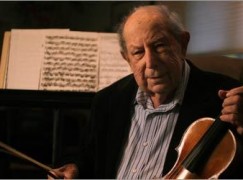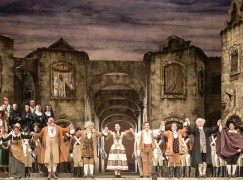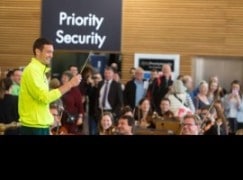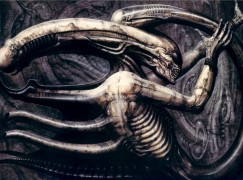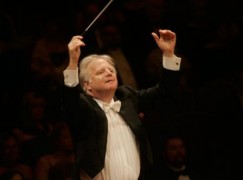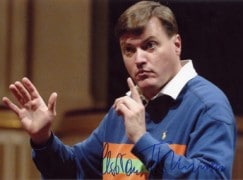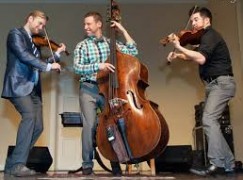I’m planning to hear the National Youth Orchestra perform it at the BBC Proms. Here’s a transcript a friend has made of Leonard Bernstein’s 1973 Harvard lecture. Where Lenny is sometimes factually wrong, he is often emotionally right – in both verbal and musical forms of interpreting Mahler.
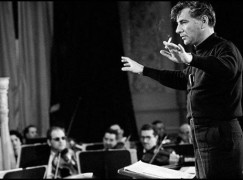
Leonard Bernstein on Mahler’s 9th symphony
Harvard, 1973
Mahler had a prophetic soul. The 9th is a powerful goodbye to the 19th century and a prophetic view of terror of the new century. Mahler’s 9th is his last will and testament. After Mahler’s 9th things are suddenly clearer. We may have a new perspective.
Why is Mahler’s 9th symphony his last will and testament? Why end a lecture on 20th century composing after having spoken about Alban Berg and Schoenberg. Isn’t that backtracking? Why regress into that fateful year of 1908? It is, because the 9th symphony itself is a great question. And it is more: a deeply revealing answer.
Initially I wanted to talk to you about Mahler’s 9th by demonstrating on the piano the dualism in his work which reflects the dualism that tore Mahler apart. A composer yet also a conductor. A Jew yet with Christian beliefs. The sophisticated yet naïve. The provincial and the cosmopolitan. An Easterner and a Westener and all the rest. This resulted schizo dynamics of his music, his ambivalent tonal attitudes, I wanted to analyse the essence of the tonal crisis revealed in his work by showing his non-resolutions of tensions, his reluctant attempts to let go of tonality which make 9th a testimony to his torture, his being torn between the traditions of the great Austro-German music and the new atonal music. Mahler knew he was the end of the line the, last point in the great symphonic arc that began with Haydn and Mozart and finished with him. It was his destiny to sum up the whole story of Autro-German music, to recapitulate it and tie it up, not with a pretty bow my any means but in a fearful knot made out of his own nerves and thoughts.
But while re-studying this work, especially the final movement, I found more answers than I expected, as we also do if we go back to study a great work. And the most startling answer, because it illuminates our whole century from then to now, is this: Ours is the century of death and Mahler is his musical prophet.
Why is our century so uniquely death ridden?
Couldn’t we say this about other centuries as well?
Wasn’t also the 19th century poetically preoccupied with death whether as late as Wagner’s “Liebestod” or as early as Keat’s “Nightingale”? I’ve been half in love with easeful death / called him soft names in many amused rhyme…
Yes, true, poetically, symbolically. And do not all centuries offer a long record of the struggle to survive, to deal with the problem of mortality. Again, yes. But never before has mankind ever been confronted with global death. Total death. The extinction of the whole human race.
And Mahler forsaw that.
He was not alone in his vision. There have been other great prophets of our struggle, Freud, Einstein, and Marx, Spengler, Wittgenstein, even Malthus, or latter day Isaiahs, all latter-day Saint Johns all preaching the same sermon in different terms:
Mend your ways, the apocalypse is at hand!
Rilke said it too: “Du musst Dein Leben ändern!”
When Berg as a young man happened to hear a performance of this symphony, he immediately wrote to his wife back in Vienna that he had just heard the greatest piece of music of his life or some words to that effect.
The twentieth century has been a badly written drama. Act One: Greed and hypocrisy, leading to genocidal war and in post-war injustice and hysteria, boom, crash totalitarianism. Act Two: Greed and hypocrisy, leading to another world war, post-war injustice and hysteria.
genocidal war. I don’t dare continue.
What have been the antidotes? Logical positivism, existentialism, galloping technology, the flight into outer space, the doubting of reality. And over all a well-bred paranoia. And our personal antidotes? Making it, dope, sub-cultures and counter-cultures, turning on, turning off, marking time and making money, a rash of new religious movements from guruism to Billy Grahamism and a rash of new art movements from concrete poetry to the silences of John Cage. All stand under same aegis: the angel of planetary death.
What do you do if you know all this back in 1908? If you’re hypersensitive like Mahler and instinctively know what’s coming? You prophesy and others pick up your trail.
Mahler lies at the essential core of all the significant music written after him whether tonal or non-tonal. Shostakovich or Britten are at the greatest when they sound most like Mahler. Both Schoenberg and Stravinsky spend their lives both struggling in their opposite ways to keep musical progress alive, are, as different as they are, are both inconceivable without Mahler. In fact all the truly great works of the twentieth century have been born from despair or out of protests, anguish informs them all, think of Sartre, Camus, Gide, the “Magic Mountain” and “Doktor Faustus”, even “Lolita”, Eliot’s “Cocktail Party”, Picasso’s “Guernica”, Chirico, Dalí, Pasternak, Auden’s “Age of Anxiety”, Brecht’s “Mother Courage”, and on the screen “La Dolce Vita” and on the stage “Waiting for Godot”, “Woyzeck”, yes and “Eleanor Rigby”, “A Day in a Life” and “She’s Leaving Home” these are all great works born of despair and touched with death. And Mahler foresaw it all.
That’s why he so desperately resisted entering this twentieth century, the age of death, the end of faith. The truth is was the 9th symphony that spread the news, but it was bad news and the world did not care to hear it. That’s the real reason for the fifty years of neglect that Mahler’s music suffered after his death. Forget all the excuses about his music being too long, too difficult, too bombastic. It was simply too true, telling something too dreadful to hear.
What exactly was this news? What was it that Mahler saw?
Mahler saw three kinds of death. First his own, imminent death, of which he was intensely aware. In fact the the opening bars of this symphony are an imitation of the arrythmia of his failing heart beat. And second, he saw the death of tonality, which for him meant the death of music itself, the music as he knew it and loved it. All his last pieces where farewells to music and to life. Think of “Das Lieder der Erde” with his long Abschied. Think of the unfinished 10th which is really a another heartbreaking Adagio saying farewell. It was one farewell too many. I think he could never have finished it even should he lived. He had said it all in the 9th. His third and most important vision: the death of society, of our Faustian culture.
Now if Mahler knew this – and his message is so clear – how do we, knowing it too, manage to survive? Why are we still here, struggling to go on? We are now face to face with the truly ultimate ambiguity, which is the human spirit. And this is the most fascinating ambiguity of all, that as each of us grows up, the mark of our maturity is that we learn to accept our mortality and yet we persist in our search for immortality. We may believe it’s all transient, even that it’s all over, yet we believe in a future.
We emerge from the cinema after three hours of the most horrible degeneracy in film such as „La Dolce Vita“ or the hopelesness of „Godot“ and we emerge on wings from the sheer creativity of it, we can fly on to a future after witnessingthe aggressive violence of Stravinsky’s “Rite of Spring” in the concert hall, or even after listening to the bitter sweet cynicism of an album called “Revolver”. We have wings to fly on. We have to believe in that kind of creativity. I know that I do. If I didn’t why would I be bothered to give these lectures? Certainly not to sit here and make a public announcement of the apocalypse. There must be something in us that makes us want to continue and to teach, to teach is to believe in continuing, to share with you critical feelings of the past and to assess the present, all that implies a firm belief in the future.
Why do I finish with Mahler in a lecture that is actually devoted to Schoenberg. Schoenberg is of the great examples of the human spirit in our century, that spirit that is after all our only hope, he is the prototype of ambiguous man compulsively engineering his own destruction while at the same time and continuously flying on into the future. We will find the same in Stravinsky. And all of this ultimate ambiguity is to be heard in the finale of Mahler’s 9th, which is a sonic presentation of death itself which paradoxically reanimate us every time we hear it.
As you listen to this finale, you have to try to be aware of what just proceeded it, three other gigantic movements, each one a farewell of its’ own. The first movement is like a great novel, a farewell to love, the second movement a farewell to the world of nature, a bitter re-imagining of simplicity, naiveté, the earth pleasures we remember from adolescence, and then the third third movement, again a kind of scherzo, but this time a grotesque farewell to the world of action, of urban and cosmopolitan life, the the cocktail party, the marketplace, the rocker’s career and dreams of success, a farewell to hollow laughter. And all three of these movements have been trembling on the edge of death and then comes the fourth, the last movement, the Adagio, and there we get the final farewell. It takes the form of a prayer, Mahler’s last choral, a prayer for the restoration of life, of tonality, of faith, it’s a passionate prayer moving from one climax to another, each more searing than the last, but there are no solutions, and between these surges of prayer there is intermittently a sudden coolness, a wide spaced transparency, a Zen-like immobility of pure meditation, this is a whole different world of prayer of quiet acceptance. Then, “heftig ausbrechend”, he writes, the despairing breaking out of the choral with greatly magnified intensity, this is Mahler back to the Western prayer, duelling with himself. In the last return of the hymn he is close to prostration, it’s all he can give in prayer, a sobbing, sacrificial last try. And suddenly that climax fails, the one that might have worked, the one that might have brought solutions, this last desperate reach falls short of its’ goal, subsides into a hint of resignation and then another hint and then into resignation itself. And so we come to the final incredible page. And this page, I think, is the closest we have ever come in any work of art to experiencing the very act of dying of giving it all up. The slowness of this page is terrifying. “Adagissimo”, he writes, the slowest possible musical direction, and if that weren’t enough, he writes, “langsam”, “ersterbend”, “zögernd”. And if those weren’t enough to indicate the near stoppage of time, he adds “äußerst langsam” in the very last bars. It is terrifying and paralyzing as the last strands of sound disintegrate. We hold on to them hovering between hope and submission, and one by one these spidery strands connecting us to life life melt away, vanish from our fingers even as we hold them, we cling to them while they de-materialise … for a petrifying moment there is only silence. And then again a strand, a broken strand. Two strands. One. None. We are half in love with easeful death. Now more then ever seems it rich to die / To cease upon the midnight with no pain. And in ceasing we lose it all and in Mahler’s ceasing we have gained everything.
(c) estate of Leonard Bernstein



